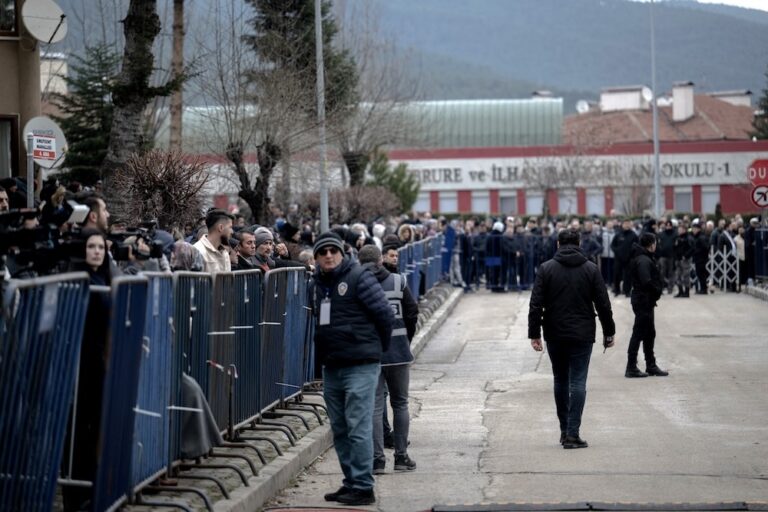(RSF/IFEX) – With initial negotiations for eleven countries to join the European Union due to start on 12 and 13 December 1997, Reporters Sans Frontieres (RSF) wishes to express its concern about the press freedom situation in Turkey, one of the countries seeking EU membership. Although six Turkish editors have been released under the terms […]
(RSF/IFEX) – With initial negotiations for eleven countries to join the
European Union due to start on 12 and 13 December 1997, Reporters Sans
Frontieres (RSF) wishes to express its concern about the press freedom
situation in Turkey, one of the countries seeking EU membership.
Although six Turkish editors have been released under the terms of a law
passed in August 1997 granting amnesty to those jailed on freedom of
expression charges, RSF is worried about other laws that restrict press
freedom. These include Article 8 of the anti-terrorism law, which covers
propaganda against the indivisible unity of the state, and Article 311 of
the criminal code (incitement to crime), Article 312, paragraph 2
(incitement to hatred) and Article 159 (insulting the Turkish national
identity, republic, parliament, government, ministers, security forces and
judges), all of which are often used to put journalists on trial. RSF
regards the Turkish government’s promise to change some of these laws as a
positive move, but wishes to stress that the reforms should be both rapid
and wide-ranging if they are to be effective.
The trial of the alleged murderers of reporter Metin Goktepe, who was beaten
to death by police officers in Istanbul on 8 January 1996, has highlighted
the problem of police violence against journalists in Turkey. Nearly two
years after his death and with eleven court hearings since the case opened
in October 1996, the Ayfon court has made little progress in considering the
allegations against the eleven officers directly charged with murder.
Violence against the media is still a serious problem in Turkey. According
to information obtained by RSF, at least fifteen journalists were tortured
while being held in custody between January and September 1997. For the
whole of 1996, the figure was 31. Also in 1996, another 69 journalists were
attacked, threatened or harassed; the figure between January and September
1997 was 97.
Covering events in the south-east of Turkey is always a challenge for
correspondents working for foreign media. Because of fighting between the
army and members of the Kurdistan Workers’ Party (PKK), a state of emergency
restricts access to the region. On 2 March 1997 Stephen Kinzer, Turkish
correspondent for the “New York Times”, was arrested in Batman. He was held
at a police station for ten hours and interrogated for seven hours on
suspicion of being a “PKK spy”. On 14 March 1997, Nadire Mater,
correspondent for the IPS news agency and a Turkish national, and two
Finnish journalists from the newspaper “Suomen Kuvalehti”, Reijo Rutanen and
Markku Niskanen, were arrested in Diyarbakir and held briefly. On 24
November 1997, police forced Gunnar Kohne, a German journalist from the
Swiss newspaper “Facts”, and Mark Simon, an American photographer, to stay
in their Batman hotel for 20 hours – allegedly for their own safety. They
finally gave up trying to do a story on the lifting of the state of
emergency, and left the region. All these journalists had the necessary
official documents to work as foreign correspondents in Turkey.
RSF wishes to protest against all of the factors that are undermining the
right to press freedom in Turkey. RSF calls on the Turkish government:
anti-terrorist law and the Turkish penal code, that curtail press freedom.
We note that the Turkish authorities have said they are willing to improve
the legal foundation for freedom of expression, and hope that this is not
just a smokescreen aimed at impressing European leaders.
harassment) of journalists.
of information.


